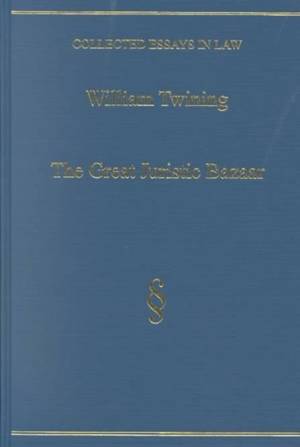
Bedankt voor het vertrouwen het afgelopen jaar! Om jou te bedanken bieden we GRATIS verzending (in België) aan op alles gedurende de hele maand januari.
- Afhalen na 1 uur in een winkel met voorraad
- In januari gratis thuislevering in België
- Ruim aanbod met 7 miljoen producten
Bedankt voor het vertrouwen het afgelopen jaar! Om jou te bedanken bieden we GRATIS verzending (in België) aan op alles gedurende de hele maand januari.
- Afhalen na 1 uur in een winkel met voorraad
- In januari gratis thuislevering in België
- Ruim aanbod met 7 miljoen producten
Zoeken
Omschrijving
Some law students find jurisprudence daunting, impersonal, dry and seemingly detached from practical affairs. William Twining believes that many jurists have been fascinating people struggling with questions that are both historically significant and relevant to contemporary issues. This book brings together previously published essays that centre on three related themes: reading Juristic texts, the role of narrative in law, and relations between theory and practice. Building on a pragmatic view of jurisprudence, the author explores different ways of reading and using Juristic texts, to set them in context, to bring them to life and to engage with the reader's own concerns. He applies this approach to throw fresh light on four familiar figures - Holmes, Bentham, Hart and Llewellyn. Challenging limited agendas and parochial points of view, Twining outlines a programme for a broad approach to legal theory in the context of globalization. He satirizes some bad habits in jurisprudence and explores in depth how stories can be seductive vehicles for cheating in legal contexts, yet are essential for making sense of disputes about fact or law.
Specificaties
Betrokkenen
- Auteur(s):
- Uitgeverij:
Inhoud
- Aantal bladzijden:
- 518
- Taal:
- Engels
- Reeks:
Eigenschappen
- Productcode (EAN):
- 9780754622116
- Verschijningsdatum:
- 9/05/2002
- Uitvoering:
- Hardcover
- Formaat:
- Genaaid
- Afmetingen:
- 152 mm x 229 mm
- Gewicht:
- 857 g

Alleen bij Standaard Boekhandel
+ 641 punten op je klantenkaart van Standaard Boekhandel
Beoordelingen
We publiceren alleen reviews die voldoen aan de voorwaarden voor reviews. Bekijk onze voorwaarden voor reviews.









